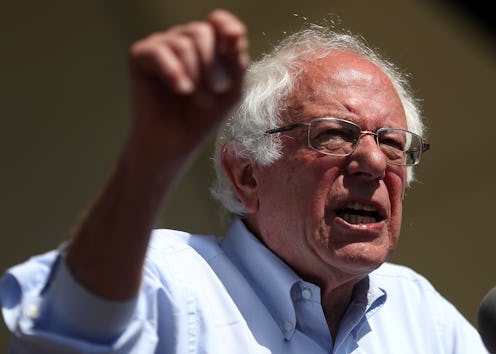News
How Many Delegates For Bernie In West Virginia?
Don't look now, but even though the presidential primaries for both parties look all but settled, there's still a little bit of intrigue on offer. Whether it's presumptive GOP nominee Donald Trump (it still hasn't really sunk in yet) swiveling his fire onto Hillary Clinton, or Ted Cruz musing about re-entering the race, or the ongoing "zombie" Democratic primary, things haven't settled quite yet. And the sole remaining underdog in the race is still fighting the fight — so, how many delegates did Bernie Sanders win in West Virginia?
While the eventual outcome of the Democratic nominating race has looked very predictable for a while now, given the longstanding state of the delegate math (Clinton has been leading by hundreds of pledged delegates for months), Sanders has continued to campaign hard throughout the primary states, including stops in the Mountain State. A pair of polls heading into Tuesday suggested that he could be very competitive there, a show of the progressive firebrand's enduring popularity.
And sure enough, Sanders carried the day, ensuring him a majority of the state's 29 pledged delegates. The Democratic primaries all utilize proportional delegate allocation, however, which means that the margin of victory matters a lot.
So, just how much reward did Sanders get out of Tuesday night's win? According to The New York Times, at the time of this writing with 96 percent of precincts reporting, Sanders has claimed 16 pledged delegates to Clinton's 11. This means his total pledged delegate deficit has shrunk from 291 to 286.
Needless to say, that's not exactly a game-changing gain with just seven states left on the schedule (as well as Washington D.C. and the U.S. territories Puerto Rico and the Virgin Islands), and that underscores the dire straits that the Sanders campaign is in. As it stands now, he'd need to win every remaining contest by staggering margins to claim the pledged delegate lead, far outpacing how the polls suggest he'll do. And that's the only realistic avenue for him getting the nomination — the Democratic superdelegates, controversial though they may be, have never before handed the nomination to a candidate who trailed in pledged delegates heading into the convention.
It is a remarkable and impressive show of strength for his campaign to still be winning states, however, and it's a testament to just how powerfully grassroots progressives have flocked to his message. Buoyed by his record-setting (and still ongoing, despite the long odds) small-dollar individual donations, he's clearly making good on his pledge to take his campaign all the way to the Democratic convention, and to make sure every state's primary voters have the chance to voice their support.
